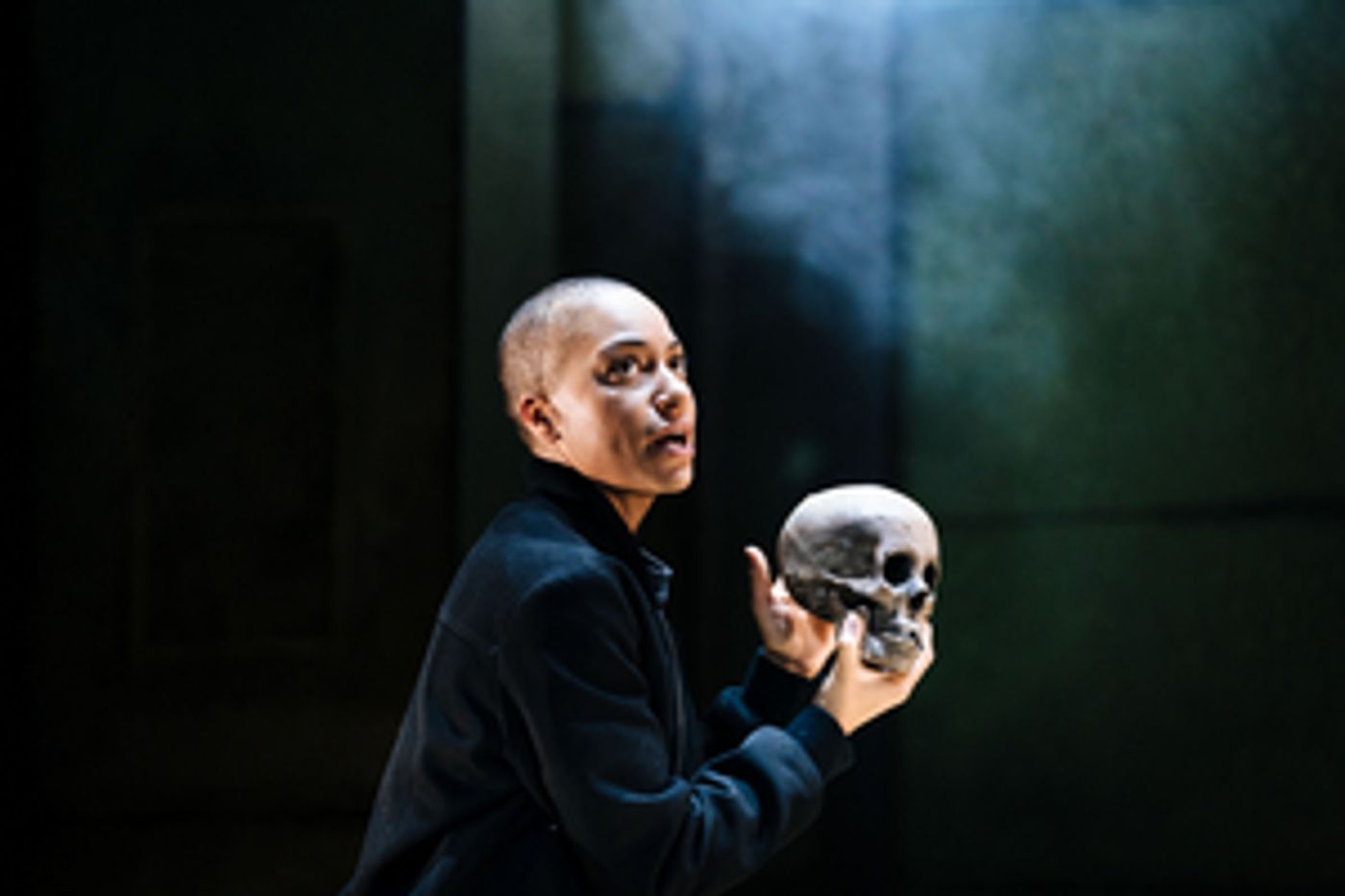Review: HAMLET, Young Vic
Cush Jumbo stars as a charismatic Hamlet at the Young Vic.

![]() At long last, the Young Vic has unveiled Cush Jumbo and Greg Hersov's hugely anticipated and much delayed collaboration on Hamlet. Jumbo, familiar to many from the US series The Good Fight, joins the ranks of female actors who have tackled the gargantuan role of the Danish Prince in Shakespeare's great tragedy. In Hersov's abstracted - and often unwieldy - Elsinore, she portrays with charming confidence an increasingly charismatic Hamlet whose masculine pronouns are retained, but whose gender identity is left richly ambiguous.
At long last, the Young Vic has unveiled Cush Jumbo and Greg Hersov's hugely anticipated and much delayed collaboration on Hamlet. Jumbo, familiar to many from the US series The Good Fight, joins the ranks of female actors who have tackled the gargantuan role of the Danish Prince in Shakespeare's great tragedy. In Hersov's abstracted - and often unwieldy - Elsinore, she portrays with charming confidence an increasingly charismatic Hamlet whose masculine pronouns are retained, but whose gender identity is left richly ambiguous.
Jumbo's Hamlet becomes more comfortable in his skin over the course of the evening, even as the character grows more spasmodic in the emotional extremes he traverses. For the most part, however, his is a mind at race with itself: in Jumbo's interpretation, the soliloquies tend to unfold rather rapidly, their reflective, revisionary quality curiously understated. Though there are moments when they fail to land theatrically, this Hamlet's musings still manage to pull - indeed, wrench - the strings of the mind and the heart.
The prevailing sense is that of a character whose madness is not so much feigned as gradually unmasked, and the workings of grief on this vulnerable psyche are movingly evident in Jumbo's performance. Jokey, acerbic, and at times cocksure, her Prince prefers to hide his 'pale cast of thought' beneath his outbursts of emotion and locution.
Not that there is much space to hide things in Anna Fleischle's spare set, which is centred around three revolving pillars. These regulate the entrances and exits, and occasionally accommodate hologramlike projections, especially to depict ghostly apparitions. The minimalism of this scenography is useful insofar as it foregrounds the stage action and creates rich configurations of light and shadow (accentuated by Aideen Malone's lighting design). And yet, its nondescript quality also renders the world of the play somewhat fuzzy: the production's contemporary setting - which deploys smart phones, vapes, and credit cards - feels a bit untethered in this mustard-coloured temple.
Accordingly, this Denmark is less a prison than an airy site of ennui. Adrian Dunbar's Claudius, for instance, remains unduly static over the production's three-hour run. It would have been rewarding to see his cool, ostensibly calm demeanour start revealing its inner darkness at some point. He emerges instead as a half-hearted villain who appears oblivious to nearly everything that transpires around him. A similar reduction in depth also afflicts Tara Fitzgerald's Gertrude, whose brusque manner, accompanied by her habitual resort to her phone, crumbles only towards the play's end, as it shows tremulous signs of remorse.
Joseph Marcell's performance as Polonius is among the strongest of the evening, as he does justice, with gusto, to every word that comes out of his mouth, coupling it with a sleekly expressive physicality. The early scene where he dispenses advice to Laertes and Ophelia is memorably authentic in the sort of familiar warmth it evokes, to which Jonathan Ajayi and Norah Lopez Holden also contribute a well-crafted sibling dynamic.
We meet Holden's Ophelia as a teenager daydreaming a romantic dance with Hamlet, and that youthful innocence persists up to her bitter end, with her mad scenes conveying a raw tenderness. Ajayi's Laertes similarly cuts a down-to-earth figure, even if his thirst to avenge his family pulls him towards extremes of passion.
Among the supporting cast, Jonathan Livingstone endows Horatio with a sympathetic, chummy energy, upon which Taz Skylar and Joana Borja also draw in their portrayal of Rosencratz and Guildenstern. When Hamlet's school friends arrive in Elsinore, their first impulse is to take selfies, posing as starstruck visitors. It's a light-hearted moment that is emblematic of the production's desire to tease out and amplify the play's humour, both evident and potential. Another such episode is the Yorick scene where Jumbo and Leo Wringer (as the Gravedigger) unearth surprising pockets of comedy from the text.
Greg Hersov's staging benefits from some commendable performances and a good grip on the play's flow (with some sly cuts), but these strengths are often compromised by the production's hesitant capaciousness. The various elements of Hersov's interpretation often struggle to come together as a coherent whole. The result is akin to a hodgepodge of promising ideas and concepts that has not been adequately refined.
Jumbo's arguably non-binary take on the Prince and the Black-majority make-up of the cast are laudable choices that raise exciting questions about gender and race in the world of the play. All the same, how - and why - Hersov constellates these and other vectors of his staging remains rather patchy, and the cumulative effect of these dramaturgical gaps is ultimately hard to ignore.
Chiefly thanks to Jumbo's stimulating performance, this Hamlet sustains interest as a hip, appealing production. We can only imagine how things might have turned out with a more grounded and consistent vision for it.
Hamlet at the Young Vic until 13 November
Photo credit: Helen Murray
Reader Reviews
Videos

